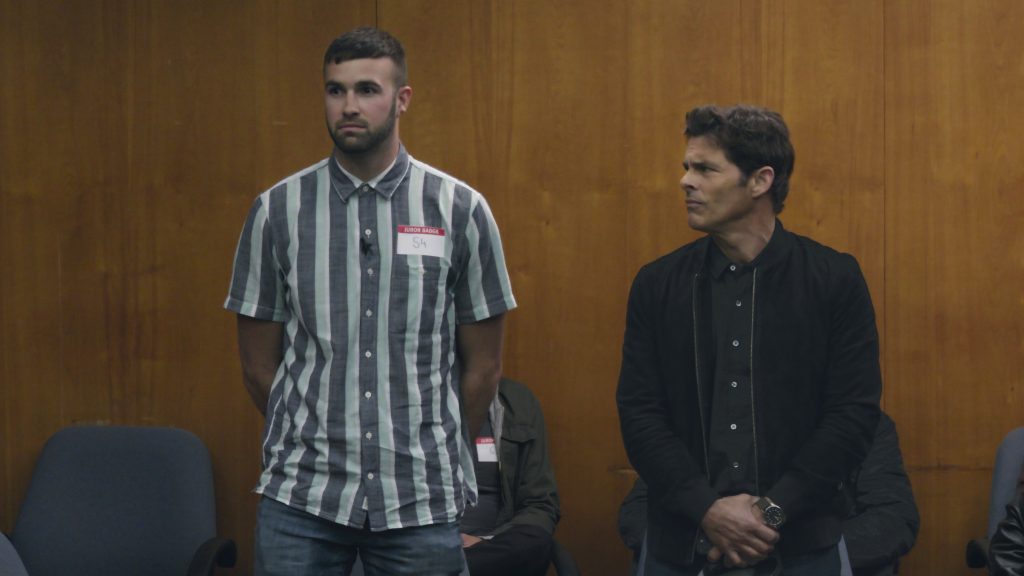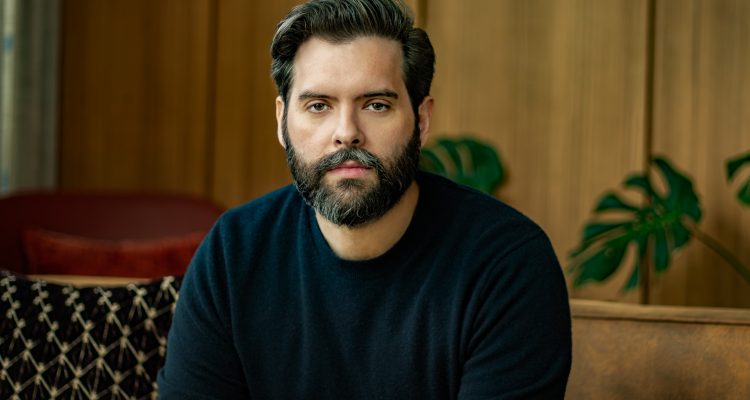From creators Lee Eisenberg and Gene Stupnitsky, Amazon Freevee’s “Jury Duty” is the surprise critical and commercial hit of this awards season. This scripted-meets-reality series is shaking up the Emmy comedy categories with nominations for comedy series, writing, and supporting actor Jams Marsden.
The cast is comprised of mostly unknown actors and brilliant first-timers like Ike Barinholtz’s father and former attorney Alan Barinholtz. This is a necessity as the actors can’t be recognized by series star Ronald Gladden as he believes he is participating in a real trail in Southern California. The actors are tasked with balancing prewritten storylines for their characters while improvising based on Ronald’s natural responses to the events of the trail and his time with his fellow (yet fictional) jurors.
After its April 7th premiere, the series has steadily grown in the cultural consciousness, with the social media clips going viral and adding massive followers to Ronald Gladden and boosting the show to an even wider audience.
Two-time Emmy nominated Executive producer Nicholas Hatton (Who is America?, Borat Subsequent Moviefilm) spoke to Awards Focus about the incredible journey of making “Jury Duty” and the magic of Ronald Gladden’s hero’s journey.
Awards Focus: There was a discussion during your in-person FYC panel (prior to the SAG strike) about the goal for series’ star Ronald Gladden to unwittingly have a hero’s journey on this jury.
When it came time for the jury to deliberate, you really have no control over Ronald’s decision making. How did you wrestle with all the possible outcomes of the jury deliberation and how that would effect the series?
Nicolas Hatton: It was key to the whole thing, the hero’s journey was really baked into the whole idea. We’re not the first show to ever use real people in a scripted environment. I’ve worked with Sacha Baron Cohen for a long time and he’s made an empire off his skills in that area.
No one had taken a person on an extended journey, let alone a hero’s journey, which was our ambition with “Jury Duty.” I’ll pull the curtain back a little, everyone has signed agreements to be on camera in these reality shows, whether it’s Nathan Felder or with Sacha or with us.
The difference is, Sacha is looking to expose people, often times bigotry, so the person on camera is someone he is trying to destroy for entertainment (laughs). For us, we never wanted the joke to be on Ronald. We wanted him to be a source of comfort for our crazy characters and someone who could help them in their ridiculous plights. We wanted the audience to feel really good about him in the end.
The original pitch for the show was, “What if you could do Jim from ‘The Office’ as a real guy and he has the journey of ’12 Angry Men’ and he is Henry Fonda in the end standing up for what is right when everyone around him just wants to go home.”
AF: James Marsden has highlighted the writing for the series, and you have a writing Emmy nomination. In terms of set pieces and the storylines of the characters interacting with Ronald, were you surprised when things plotted for later episodes came up naturally earlier in the process? What were some happy accidents that occurred during the filming of the series?
Hatton: For the most part, we kind of kept on script more than i thought we would. We had seven episodes of narrative storytelling and the eighth episode was always going to be a look behind the curtain at how we did it.
The big markers of Ronald’s journey were written in advance, we just happened to steer him through this process and he hit all his marks to an almost unsettling degree. As far as happy accidents, there were things Ronald brought that the show wouldn’t be the same without it.
The best example is his relationship with David Brown, who plays the outcast character of Todd. Todd fancies himself an inventor and he is an ex-con who has had his voting rights restored. He went to jail for an unknown reason, and we wanted to put him in the room next to Ronald (when the jury is sequestered).
The way that Ronald took the character of Todd into his heart was something we never predicted.
AF: Like when he shows him the film “A Bug’s Life,” what a moment that was.
Hatton: It was one of my favorite moments of the entire show, and it was entirely Ronald. He had gotten to know this character of Todd and he understood him for who he is, so then he asks the bailiff if they could get him a copy of the film.
Ronald sits down with Todd to watch the film in the hopes of imparting some wisdom and life lessons to him. It really spoke to the heart that this guy (Ronald) has and the things he did throughout the show… from the birthday party when James was behaving badly to comforting Noah when the girlfriend was breaking up with him.
We didn’t write that heart into the show, he brought it and we’re very lucky because the earnestness of the show that people are responding to really came from Ronald.

AF: Can you talk about the camera placement and getting creative with how you capture these moments on the show?
Hatton: A huge question for us was, “How do we capture this show?” I think what separates us from the other comedies in our category at the Emmys. These other shows were able to have multiple takes and they could tweak the lighting or adjust lines… there was none of that for us.
We essentially built an incredibly complicated soundbox and got as much coverage as we could, and then had massive faith in our cast to live out these storylines. When you’re thinking about camera and audio coverage, we’re trying to capture as much of the physical space as humanly possible.
You also want to give yourself room for the more typical storytelling moves… Chris Darnell was our DP and he was just incredible, we’d worked together on “Borat 2.” It was important to discern when it was “OK” for Ronald to see cameras around him, with the documentary aspect, and when they had to be completely hidden.
Going into this, Ronald believed that he was signing off to join a documentary style project which happens to be following an odd civil suit in southern California. So, he knew there would be cameras, but we had to hide the size and sophistication of the machinery so that he never felt it was bigger than he thought it was.
All of episode six, the cameras in the park, those are all hidden… we had cameras in trees, porta-potties, and bags on tables. With the Margaritaville sequence, the cameras were hidden behind mirrors, disco balls, and tropical trees.
AF: When you look back at this experience and experiment that landed universal praise and four Emmy nominations, how do you feel and would you be open to continuing the formula in another town with a similar hero’s journey?
Hatton: Right now we’re focused on enjoying this ride, the show came out in April and it still feels like we’re getting new blessings… like Margot Robbie and Ryan Gosling talking about the show (laughs). It’s amazing the new things that we hear every week.
Right now we’re in a strike for our writers and actors we have no thoughts for any future versions of the series, but there’s a word of possibility out there. “Jury Duty” showed me that with the right folks and the right spirit, you can really do some incredible stuff that you wouldn’t think you could do on paper.


